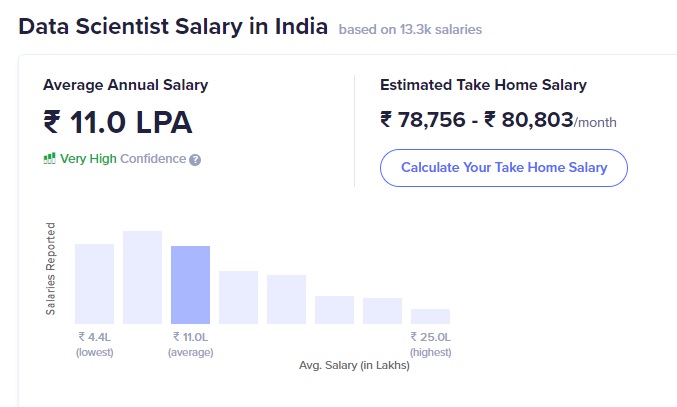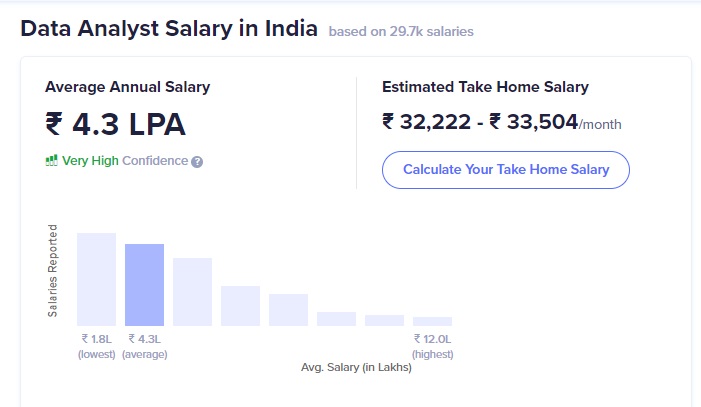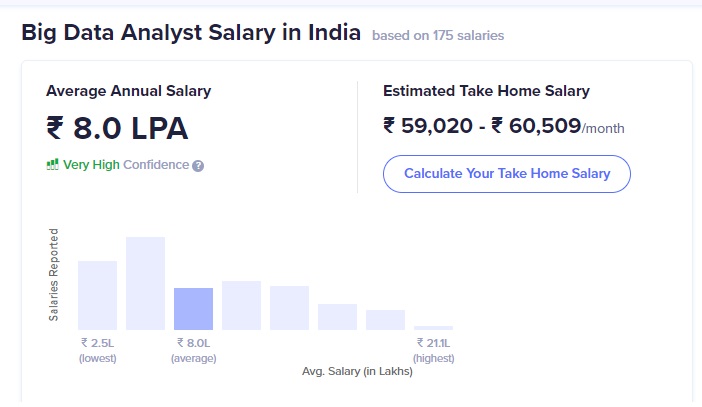Data Science vs Data Analytics vs Big Data
Big Data, Data Science, and Data Analytics are the three major buzzwords that are used to describe the data. In this article we will briefly describe how these three keywords are different from each other, their applications and how to become professional in the respective domain.
You may have often heard the comparison that in this age of technology ‘data is like gold’. According to a report by EMC2, the digital universe is growing at a 40% rate per year in the next 10 years. Companies have been extensively using data science, big data, and data analytics, supported by robust technological solutions and highly trained teams. As Oracle suggests companies have a treasure trove of untapped data. Along with the growth of data, there is a rise in the number of roles and opportunities concerned with harnessing this data. Data Science, Big Data, and Data Analytics — we have all heard these terms. Apart from the word data, they all pertain to different concepts. This article will help you understand the concepts of Data Science vs Data Analytics vs Big Data and also guide you on the various ways you can become a professional in any of these fields.
Data Science vs Data Analytics vs Big Data: What are the Differences?
Unless we are experienced in those professional fields, it is quite confusing. This makes it difficult for anyone who is looking to start a career in data-related work. This is why we have decided to throw light upon the characteristics of the three profiles.
Data Science
When the term ‘science’ is associated with data, one can understand that it is a broad area where scientific methods, maths, statistics, and a host of other tools are applied to data sets in order to extract the required knowledge and insights. Data science is an umbrella term for all data conversion tools, methods, and scientific models to understand underlying patterns of complex systems.
To learn more about data science, read our blog – What is Data Science?
Data in raw form is unintelligible and obscure, with unfiltered noise, and misleading patterns and information. This is where data scientists play an important role; deriving meaningful conclusions from collected data. Some time ago, Harvard Business Review declared ‘data scientist’ as the “sexiest job of the 21st century” and judging from how important data is nowadays, it is no surprise.
Applications of Data Science
There are a lot of areas where data science has disrupted the industry and has changed the way things worked. Here are some of the prominent areas where data science plays huge roles:
Must Read – Top 10 Data Science Applications
1. Advertising and Marketing
Did you ever think about how some of the products that you are searching for on the internet get displayed in ad banners on random websites? This is known as retargeting or remarketing. The products to be displayed to the targeted audience are decided using data science.
With the help of data science, the patterns or the behaviors of the user can be determined and can be targeted accordingly. This has led to digital ads becoming more successful, having higher CTRs than traditional print advertising.
2. Search Engines
Data science is behind the success of the algorithms used by search engines. To deliver the best results for a search query, these search engines take the help of data science to process the huge amount of queries and transform them into meaningful patterns. This provides the best results and also helps the search engine to keep on developing its understanding of the users’ requirements.
3. Delivery Logistics
Nowadays, e-commerce has become a prominent industry with a lot of people shopping online. This has led logistics companies to improve their delivery experience; leading companies to use data science to understand the best routes, transportation modes, and delivery times. Thus, data science has helped these companies to deliver better with cost-efficiency.
4. Fraud and Risk
Finance companies have to be constantly on their toes to not fall into bad loans, debts, or losses. With the help of data science, the companies can do a wider security check. They can also improve the profiling of customers and also analyze previous data to find patterns that would help them in fraud and risk detection.
You May Like – The Future of Data Science
How to Become a Data Scientist? – Skills and Techniques
Data Scientists are usually those who have high skills in analytics and are great data wranglers. Most of them hold a master’s degree or a Ph.D. degree, with tremendous skills in maths, statistics, and programming. These are the skills you should focus on:
- Technical skills like machine learning tools, data mining, data munging, and unstructured data techniques
- Programming skills like understanding of R, Python, C/C++, Pearl, Java, and SAS languages
- Understanding of database systems and Hadoop platforms
- Business skills like effective communication and industry knowledge
- Get certified in one of the prominent professional certifications like Cloudera Certified Professional: Data Scientist
Best-suited Data Science for Business courses for you
Learn Data Science for Business with these high-rated online courses
Big Data
To define in a simple way, big data is the large volume of data (both structured and unstructured) that cannot be analyzed using traditional methods. The term, “big data,” is itself a relatively new one and its importance has grown in the last 5-10 years, with organizations beginning to see the various advantages that it offers.
Though data has always been there and the collection of data is also nothing new, the concept of big data is totally different. Big data can be defined by three Vs – volume, velocity, and variety. As already mentioned, big data is literally huge, and other than that, it also streams at an unprecedented speed and comes from a variety of sources.
The ability to handle this data and analyze the meaningful patterns is going to help companies to reduce their production time, offer personalized services, reduce waste and make a quick decisions regarding customer buying habits.
Applications of Big Data – Industries and Areas
Big data is relatively new compared to the traditional method of using analytics in businesses and has already found applications in various industries. Here are some examples of applications of big data:
1. E-learning
Like big data, e-learning has grown in terms of popularity. With the help of big data, e-learning companies can have a good understanding of the learning behaviors of the students to improve the learning experience. Big data can be used to analyze the popularity of courses and e-learning companies can give more attention to the courses on a regular basis.
2. Finance Industry
Banks suffer huge losses through events like fraud and bad loans. Through big data, companies can check for such risk patterns and keep track of any such transactions or anticipate if a customer is going to default in repaying the loans. Big data can also help companies to understand the spending behavior of high-worth customers and offer them services that will beneficial to both sides.
3. Internet
Big data is going to help online marketing divisions to better understand their customers or clients. Through big data analytics, businesses can find out the buying behaviors of the customers and create loyalty programs, which will attract more customers. Big data can also help companies to remarket or retarget ads online for better conversions.
How to Become a Big Data Professional – Skills and Tools
Anyone with good mathematics skills and basic programming skills can go for a big data professional job. Let us look at the various skills and tools that can help you become a big data expert:
- Good analytical skills to solve problems and data visualizing skills to seek meaningful patterns from a huge amount of data
- Basic programming skills in languages like R, and be proficient in database development and management
- Technical skills like data mining, mathematical analysis, and statistical computing
- Business skills like communication, and understanding business objectives
- You can get certified in a popular big data certification. Take the help of an online course, if you want to be successful
Data Analytics
Data analytics can be said to be nearly similar to data science, but it has a more focused role in comparison. In data analytics, the analysis of data is concentrated in specific areas with specific goals in mind.
Organizations or businesses use data analytics to find particular correlations between their services or products with what customers want to make informed business decisions. It is also used by scientists or researchers to verify specific theories or come up with certain conclusions.
As Techopedia defines, “Data analytics refers to qualitative and quantitative techniques and processes used to enhance productivity and business gain.”
Applications of Data Analytics
Data analytics can be found to be an important part of most businesses and industries. Here are the most common applications
1. Business Intelligence
One of the widely used areas of data analytics is business intelligence; through which organizations can improve and optimize decisions and performances. With the rapidly changing landscapes of IT and industries, there is a need for proper business intelligence to be successful. This is where data analytics plays an important role in keeping businesses updated and formulating solutions.
2. Travel & Hospitality Industry
Data analytics have shaped the current online travel and hospitality industry. Through data analytics companies can get insights into the traveler’s experiences and preferences. They can understand what is currently lacking in the market that travelers want or which type of market audience (solo travelers, business travelers, or family tourists) should they target. Data analytics can also help in customizing the online experience of travelers when it comes to packages and deals or even recommendations based on their interests in various social media or other websites.
3. Healthcare
The healthcare industry is a pretty stable industry, but there are a lot of things that data analytics can change and have changed in the past few years. Data analytics can help in improving the medical help provided to customers and optimize the patient treatment process. It can also help in tracking the efficiency of medical equipment use.
How to Become a Data Analyst
Data analysts have nearly the same skills as data scientists. Here are the skills that will help you to be a good data analyst:
- Technical skills like mathematical, statistical, data mining, and machine learning
- Programming skills in querying language (SQL), a scripting language (Python, Matlab), statistical language (R, SAS), and Excel
- Soft skills like communication and understanding business requirements
Must Read – How to Become a Data Analyst from Scratch?
Salary Comparison
According to Ambitionbox –
- The average salary of data scientists is ₹ 11 LPA
- The average salary of data analysts is ₹ 4.3 LPA
- The average salary of big data analysts is around ₹ 8 LPA
Conclusion
With the above information, you can now safely navigate through the confusion that arises when comparing data science vs. data analytics vs. big data profiles. Since, now, you have a fair idea about data science vs data analytics vs. big data, you can start your learning accordingly. Prepare with the help of an online course and then get certified to be an expert in one of the three fields.
FAQs
Which is better Big Data, Data Science, and Data Analytics?
All are different domains Big Data deals with a large and complex problem, in data analytics, the analysis of data is concentrated in specific areas with specific goals in mind while data science made conclusion from the extracted data using multi-disciplinary approaches.
Which pays more Big Data, Data Science, or Data Analytics?
As mentioned above the average annual salary of a Data Scientist is more than both Data Analyst and Big Data Analyst. The average annual salary of Data Scientist is around 11 LPA while Data Analyst and Big Data Analyst are 4.5LPA and 8LPA respectively.
Does Big Data require coding?
Yes, it requires coding but not at the advanced level like the software engineer do. You have to learn the basics of coding.
This is a collection of insightful articles from domain experts in the fields of Cloud Computing, DevOps, AWS, Data Science, Machine Learning, AI, and Natural Language Processing. The range of topics caters to upski... Read Full Bio






